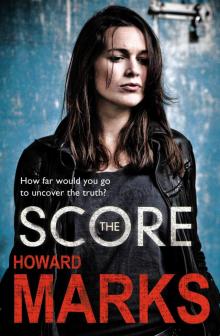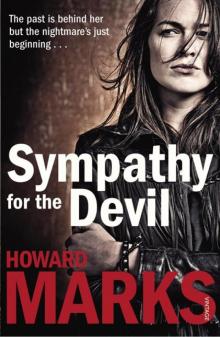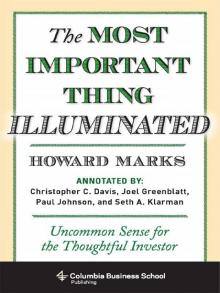- Home
- Howard Marks
The Score Page 21
The Score Read online
Page 21
Cat said ‘yes’ and would have said something else, but Kyle was already gone.
Cat made a roll-up and smoked it quickly. That full English breakfast was still making its presence felt. It was bad food for her. Her body needed vits and good quality proteins. She looked down at her forearm, the skin puckering to gooseflesh. Sweat was cooling on the small of her back. Her face was hot then covered with a creeping chill. It was partly the withdrawal symptoms, partly exhaustion.
Enough prevarication. She called the number Kyle had given her. It went straight through to voicemail.
Sometimes she still thinks of home.
Her mother, her father. The tinny sound from the TV downstairs as she was practising her singing upstairs.
Her room. The pictures she’d clipped out of magazines. Singers she liked, men she fancied.
All a world away.
She is frightened to let him see.
Sometimes she cries. Not for any specific reason, but the way exiles cry. For a country that was hers and will never be hers again. Sometimes the tears seem to go on for ever.
16
THE TAXI DRIVER drove fast, aggressively, in tune with Cat’s mood. Rain gusted against the windscreen. There were only a few people out, huddled under umbrellas.
In three-quarters of an hour they made Blackheath. The street turned out to be a well-lit cul-de-sac, fringed by trees and houses whose frontages at least seemed as impressive as the Highgate properties. But the multiple doorbells suggested most had been divided into small flats and bedsits: dimmed lights flickered over galley kitchens and over living spaces just big enough for a couple of armchairs and a portable TV.
Cat paid off the driver at the head of the road, somehow not wanting him to know her final destination. He gave her a blank receipt, which she pocketed. She could argue with her conscience later about how to fill it out.
The girl’s house was about fifty yards down. It was set back from the road, the hedges lacking any structure, growing out onto the pavement. The paint of the front door had faded to a dull brick and partly peeled away. The column of ill-assorted doorbells gave no hint as to the house’s inhabitants. There was no list of flat numbers. On the ground, a crumpled KFC box spilled chips onto the concrete.
She started with the bottom doorbells, worked from left to right. The right-hand bell on the second row brought a response. A gruff voice, apparently not surprised at a visit from a stranger on a rainswept night. A buzzer sounded, releasing the door. Inside, the lighting was dim. She followed the stairs up to the next floor. Two doors led off the landing. She listened for signs of life. Silence at first, then the sound of a floorboard wincing behind the door on her left.
She slapped her palm against the door. And again. Another creak. The door opened, revealing a chain. Cat pulled her warrant card out of her pocket. Thrust it forwards. Reached back into her pocket, took out the image of the girl frozen on her screen, held it to the door with her other hand.
‘Which flat?’
The door closed.
She shouted, ‘Hey!’ Slapped her hands hard against the wood.
‘If you want me to call my colleagues and have them break this door down, I’ll do it.’
From inside: ‘Give me a moment.’
The man disappeared for just long enough to hide his drugs, then came back and unslid the chain. He backed away down his small hallway, seemingly caught between fear and politeness. She was police, but she wasn’t behaving like police. Cat tried to take in the flat, but the lighting inside was only just brighter than it had been in the hall. The walls were covered in framed prints to an eccentric extent. There were so many that they acted as wallpaper, each only millimetres from its neighbour. She peered at them. They all seemed to depict ships in painstaking detail, but they were more like engineer’s drawings than conventional art.
The flat-owner stood in the kitchen doorway, scratching his beard. He was wearing jeans and nothing else, backlit by a dying fluorescent strip which flickered on and off. The light lent him a corona that gave the scene an unearthly aura. She approached with her warrant card and her phone. He glanced at the girl’s picture briefly, motioned with his hand.
‘You want the top floor.’
She backed out quickly, took the stairs at a run. At the top there was a door on its own. This was a converted attic room, the door much shorter than normal, the slope of the roof cutting the hinges on the diagonal. Unless the landlord had a habit of renting this room out to the seven dwarves, the tenants must have had to crouch to enter.
Cat knocked but there was no reply. She crouched, pushed at the door, pushed again. Back down to Mr Jeans downstairs. She asked him if he had a key, if anyone was a likely keyholder for the girl on the top floor.
He knew nothing.
Cat went back upstairs. There was no real choice here. Not after Nia and Delyth. Not after Esllyt.
She sprung out a straight kick at the door, so she met the wood with the sole of her foot. Stupid. A jolt of pain went through her ankle. The lock was tougher than she had expected. She changed feet, kicked again, using the walls to steady herself. It was only on her fifth attempt that she heard the reassuring crack of splintering wood as the door swung open.
‘Rhiannon?’ There was silence.
Cat called again as she shuffled into the flat, straightened up on the other side of the door. Light bled into the room from the landing, the far side partially illuminated by the street lamps outside. The curtains had been left open. The place smelled stale.
Ahead there was an attic living space. In the right corner a galley kitchen contained the basics: a two-ring hob and sink over a small cupboard and bar fridge, a microwave. In the opposite corner there was a single armchair, a table on which stood a mug, a partly eaten digestive biscuit on a coaster. The mug contained an almost full cup of tea.
At the end of the room a door led through to another space. This was darker than the first, but a gap in the thick curtain admitted a limited amount of light. The room was dominated by a small double bed. There wasn’t room for anything else.
Some attempts had been made to make this space more homely. On the window ledge stood three large pebbles painted with psychedelic patterns, a couple of small plant pots holding cacti. Cat peered through the gap in the heavy curtains. Streetlights weakly illuminated the house’s back garden. Close to the wall she could make out an assortment of objects – rusting bed frames, old paint cans. A path, partly overgrown with weeds, bisected the grass, the wind moving the grass softly. In a tree in the garden next door, multicoloured lanterns swayed homely light – orange, yellow, red – across the detritus of the back garden.
Something caught her eye, a movement amongst the rusting debris. A shadow from the lamps maybe, as they lolled in the breeze? She looked again, another movement. No, what she had seen did not configure with the lanterns. What was it then? She glanced back into the living space, saw Rhiannon’s mug. She ran, cracked her head on the flat’s low front door as she left, took the stairs two at a time. Below she found a corridor leading to a back door, the glass in its top half latticed with wire like in an institution. She flipped the Yale latch down, headed into the garden. Cat stumbled on her way across the grass, fell to her knees, stopped still for a moment, dazed.
Out of the corner of her eye she saw something, a lithe movement followed by complete stillness. Slowly and cautiously she moved her head, saw two shining beads ten feet away from her, suspended from the ground. She focused. The beads were two eyes, staring at her from above a fragile snout. A fox, quite a young one. That’s what she had seen from the flat’s window, an urban fox nosing through the rubbish.
She stared at the creature, it stared back, stock still. It seemed to tremble with fear of her. She felt tender, she relented, waved her hand quickly to scare and release it from their immobilising gazes. The fox flinched, darted on silent paws deeper into the darkness of the garden and was gone.
Cat rose up from her knees, pulled out her mobile to try to call
Rhiannon again, peered across the garden as she dialled. The phone rang, and what was that? Some trilling like cicadas. She moved towards the sound, which now increased in volume. She closed the call to Rhiannon and abruptly there was silence.
Cat pelted deeper into the garden, towards the sound she now knew was Rhiannon’s ring tone. She reached a patch where the long grass lay differently, wasn’t moving in the wind. She glimpsed something light, a silver belt over white jeans. Cat fell to her knees, crawled along the grass, parting the tall stalks with her hands.
The girl was lying on her back, the body that used to be Rhiannon Powell. That used to be a singer. That used to choose a silver belt to go with her new white jeans.
Cat reached across, carefully pulled the jacket open. Dark crimson. The breasts of the girl were punctured and soaked with blood. Cat touched her. She was as cold as the garden.
Cat felt herself tremble. She made to retch, but nothing came. She looked up and the surrounding windows were dark. It was unlikely she had been seen by anybody. Some crazy part of her wanted to stay with the girl, offer her some respect, some consolation, but she knew she couldn’t. The part of her that felt the most warred with the part of her that thought the most. The thinking side won, as it had been trained to.
She called Kyle, told her what had happened. This situation wasn’t just Cat’s problem, it was Kyle’s too now. What story could Cat give for finding the body that didn’t simply track back to the IP address, obtained without warrant?
Kyle thought briefly, then said, ‘Just call it in. I’ll handle the IP address.’
‘And link it to Riley? What do I tell the Met?’
‘This is Thomas’s case. Tell the Met anything you like, but this is Thomas’s case.’
‘OK.’
Cat left the garden through the house and made the call. The police operator told her calmly a response team would be with her shortly.
Cat made a roll-up, hands shaking. She would call Thomas but not yet.
She would call Martin too, but she had only bad news for him. Her chances of finding Esyllt alive, already poor, had just diminished significantly. The night suddenly seemed very dark.
17
IT TOOK CAT four long hours to fight her way out of the Met’s clutches. They were pissed off that she – some junior cop from a force that the Londoners regarded as half-assed – had beaten them to a murder scene. But twice as pissed off that she couldn’t offer a plausible story about how she’d come to be there. She’d heard one of the detectives on the road outside the crime scene trying to explain it to a newly arrived colleague. ‘Something about a YouTube video. The girl was singing it wrong or something.’
No one liked Cat’s explanation. No one liked the little IP dodge, though no one wanted to do anything official about it – after all, it was a dodge that had led to a dead body. No cops were going to get their wrists smacked for that. But most of all, no one liked the way that when any question got too close to the nitty-gritty, Cat just clammed up and said primly, ‘I’m not sure I have authority to answer that. You should probably consult DI Thomas in Camarthen.’ The lovely people from the Met chose to interpret that as a big Welsh fuck you, which was precisely how Cat intended it. They tried to give her a hard time for a few hours, then got bored and let her go.
Walter had told her that she could stay at his friend’s dojo for as long as she needed it, but that didn’t feel right. It was too clean. What she had in her head didn’t fit there. So she settled instead for a Travelodge, checked in with a girl at reception who looked like the job had already killed her brain.
Cat walked the nylon carpet under fluorescent bulbs to her room. She let herself in, then carefully relocked the door. She sat down on the regulation chair, its cheap upholstery pristine, still scented with the shrink-wrapping it had recently shed. Then she stood and moved to the window glowing with lights from the car park. Cat flicked the curtain, checked for any new vehicles outside, saw nothing. And what was she looking for anyway? She dropped the curtain back.
In her mind she ran chronologically through the roll of the missing and the dead. Lisa Marr. Katie Tana. Sara Armitage. Nia Hopkins. Delyth Moses. Esyllt Tilkian. Rhiannon Powell.
She realised in her mind she’d counted Esyllt as among the dead. Maybe she was right to do so. She went to the bathroom, took the hand-towel, stood on the chair to jam the towel into the room’s smoke detector then sat on the bed and smoked some canna. Fleas held a carnival beneath her skin.
Before she thought about it too much and nerves jittered her out of it, she made another call. It was long overdue. She left a message for Martin saying there had been developments. She made sure there was nothing in her voice that would give him false hope. That wasn’t difficult.
She felt too tired to even undress, just lay on the bed, staring at the ceiling as though it were the night sky. She dipped into sleep but after a few moments something yanked her back into half-consciousness, and she noticed she was sweating. Images from her past came back to her, unbidden. Sneaking out of the house to Martin’s home. Jogging round the corner onto the long stretch of Bryant Road that led to Martin’s. Number twenty Bedder Terrace – probably wearing her Death to the Pixies T-shirt, the same one she still had, and her favourite pair of trainers; black with black fraying laces. In better times they would have talked to each other and got through this.
Cat lay back on the bed. Although she was now a husk, a nothing with only the need to rest, sleep evaded her. Bad thoughts. She needed company. She only knew one person in London – or at least only one person she could face seeing. She asked reception to call her a minicab and got it to take her to Battersea. They drove slowly into Lombard Road. To the right were the towers and ziggurats of the riverside complexes. Oyster Wharf. Falcon Wharf. Candlemakers. The wedges of Battersea Reach, vague and placid presences.
They got to the address she had on her phone. Rob’s address. Her benzo buddy. He could cope with her.
His apartment block was shaped like an L and covered in glass like a giant crystal. She wasn’t sure what she was doing. He was almost certainly sleeping. Even if he wasn’t, she knew she should have called first; he had told her that, been very clear. His shyness demanded it.
In the brightly lit lobby a concierge was sitting. He looked half-asleep. She walked in through the open doors, and he didn’t look up. She looked at the postbox to the flat number Rob had given her. There was no name on it.
Next to the lifts there were service stairs that went up the outside of the building. She took those. The steps were concrete, and on each landing were yellow safety lights. There was a view down to Putney. More darkness, more dim lights.
On the stairs she did not think, she was an automaton. At Rob’s floor, she came out into the L-shaped passage. The air felt close and artificially freshened. She checked the flat numbers then counted round, breathing heavily now. She found the flat, wanted to walk away and so knocked hard and quickly. She waited, butterflies in her stomach. There was no answer. This was stupid: she turned to go. A sound behind the door, footsteps muffled by carpet, locks clicking open.
‘You’re late, you fuck. It better be good,’ an uneven voice came before the owner of that voice was visible. Was that Rob? If so, he sounded coarser than he did on Skype.
The door opened. A dim face in the entrance, clammed with night sweat. It was Rob. He frowned, scowled, recognised her and looked down.
‘Rob, I …’
‘Cat?’ The word seemed hesitant.
‘It’s late, I can go. Sorry.’ She felt a fool.
She thought he wanted her to go, but, ‘God, no come in,’ he said. He was obviously middle class. He stepped aside, slumping against the door jamb as though he were dizzy, mussing his hair, bowing his head. She stepped inside over wooden floors.
‘I was expecting someone else.’ His voice came from behind her as she walked timidly down the hallway. ‘Hours ago, though. In here,’ he said. ‘On the left.’
His voice seemed slightly slurred. The effects of abrupt awakening maybe. They made the lounge, a deep cream sofa, a large plasma screen on the wall, turned off. She saw a rocking horse by the sofa, a small blue plastic feeding chair, a jumble of primary-coloured plastic figures on the floor by a walnut coffee table. Her heart shrank.
‘You’ve got a kid,’ she said, turning around, catching the glassiness of his eyes before he averted his face, looked down at his bare feet splayed on the wooden floor.
‘Two,’ he said. ‘Boys. I should have said.’
‘Why should you have?’
He ignored the question, told her now. ‘One by the wife who chucked me out. Another by, well, someone else.’
‘You’re not with her now?’ Cat was not being subtle, but then she had just come to his flat in the middle of the night. Such behaviour precluded subtlety.
‘No, I’m not. The kids don’t live with me. I see a lot of the youngest though, am trying to get visiting rights for the older. Ex-wife’s not too keen.’ Still he would not look at her, he turned his back, sloped over to the open-plan kitchen off the back of the lounge. He fussed in the kitchen, accidentally knocked something over, swore.
‘Are you OK?’ Cat asked.
‘I’m fine. Er, do you want some wine?’
‘Wine?’ It was the middle of the night, but still. Rob knew, if anyone knew, that Cat and wine would not be a good combination right now.
‘Of course you don’t, sorry. Coffee?’
Did he drink wine himself? He shouldn’t with his history of Benzos. Still, it had been a long time since he’d kicked them. Maybe he was allowed.
‘Sit down,’ he said, his back to her still as he filled up the kettle. ‘You surprised me.’
‘I surprised myself.’ Cat did not sit, she was wary of her worn clothes touching the cream sofa. She became self-conscious, remembered the sweat she had woken with, the coffees and roll-ups she had consumed. Her breath must stink; her body also.

 Mr Nice
Mr Nice The Howard Marks Book of Dope Stories
The Howard Marks Book of Dope Stories Senor Nice: Straight Life From Wales to South America
Senor Nice: Straight Life From Wales to South America The Score
The Score Sympathy for the Devil
Sympathy for the Devil The Most Important Thing Illuminated
The Most Important Thing Illuminated Senor Nice
Senor Nice Howard Marks' Book of Dope Stories
Howard Marks' Book of Dope Stories